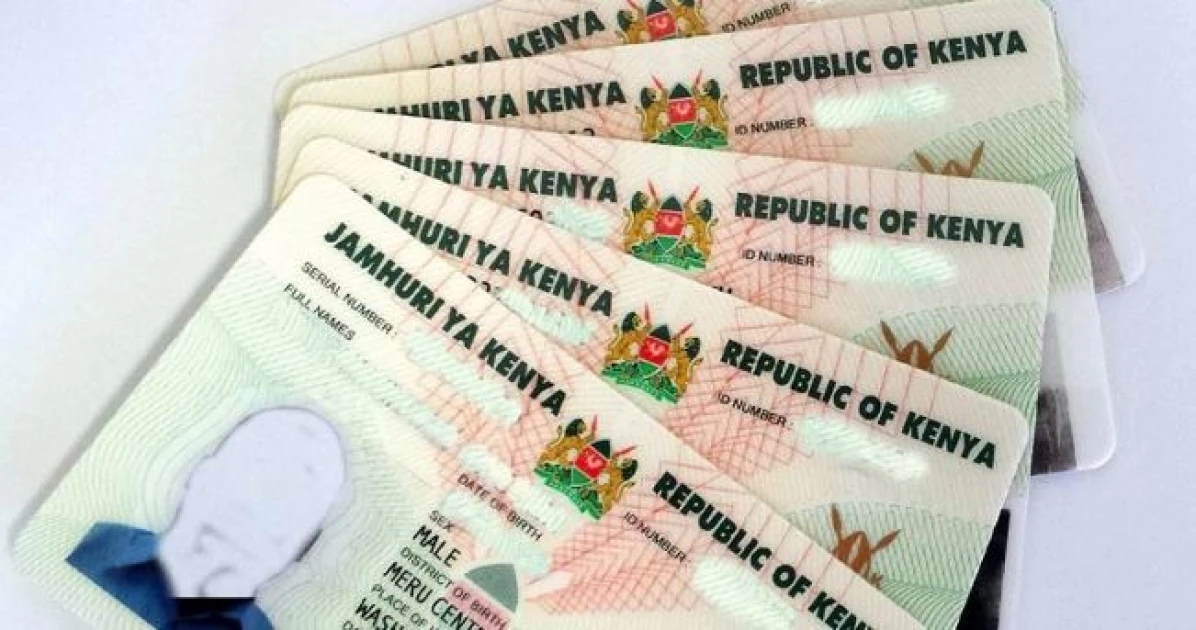New ID registration guidelines elicit opposition from civil rights groups

File image of the Kenyan Identification cards
Kenyans living in border, cosmopolitan, and settlement
counties will no longer undergo vetting for the issuance of National
Identification Cards as President William Ruto scrapped the requirement on April 8, 2024.
The process has always seen applicants, often Asians, Arabs and Nubians who are not considered ‘indigenous’ communities, being required to provide proof of Kenyan citizenship to be issued with ID cards.
Ruto therefore noted that the dated processes have been discriminatory and ID issuing should not be based on religion or region.
The Ministry of Interior later, on April 29, released a set of reviewed guidelines on the issuance of ID cards which have been met with stiff contention by civil rights organisations and community-based organizations.
In a joint statement by Haki Centre, the Nubian Rights Forum, Paranet, Namati Kenya, Haki na Sheri Initiative, they argue that "the government risks replicating the arbitrary and discretionary nature of vetting in the new registration guidelines."
The new guidelines, which apply only to border and cosmopolitan areas, will see applicants providing proof of name, age, and citizenship (either through a birth certificate and parent ID card)
- All identification (vetting) committees shall cease to be effective from May 1, 2024
- All applicants for registration of National Identity Card shall be registered in their home counties or place of permanent residence for ease of identification. The applicant shall produce a chief's introduction letter to confirm residence.
- Applicants from institutions of learning in border areas or communities shall provide a birth certificate and parent's ID card. All information should be validated by the institution's head
- Registration officers shall submit copies of birth certificates presented as support documents to the local civil registration officer for verification and returned within 5 days.
- Applicants shall prove citizenship by providing a parent's ID card or certificate of registration proving Kenyan citizenship.
- Where parents are deceased, applicants shall produce death certificates or an ID of a biological relative. They will authenticate the applicant by embossing their Left Thumb Print (LTP) or the RTP on the registration form.
- A registration officer shall liase with security agencies to prevent illegal registration. A list of all registered applications shall then be submitted weekly to the National Intelligence Services (NIS) and the Directorate of Criminal Investigations (DCI) for due diligence.
- A registration officer shall also verify the application by signing and sealing registration forms provided in CAP 107 of the constitution.
The organisations now argue that the new guidelines do not address access to identification for millions of Kenyans who currently lack documents "due to the historical injustice of vetting."
They added that vesting such power in chiefs and security agencies such as the DCI and the NIS in ID application processes poses a risk in replicating the current vetting practices.
To better streamline the ID issuance process, the organisations have urged the government to abolish all the set requirements.
They want an end to ID vetting and differential treatment of ID applicants in all forms, grounding the process of acquiring identification in legislation and eliminate discretionary powers to trigger ad-hoc investigations or review committees.
"For applicants providing the required documentary proof of name, age, and citizenship, verify the documents at no cost and issue ID cards without delay or extra steps," they said.
"Implement affirmative action measures to issue identification to all Kenyans, especially those previously excluded from accessing documents due to the historical existence of discriminatory vetting."
They also want an expansion of the number of registration and identification offices especially in underserved areas of Kenya.
Want to send us a story? SMS to 25170 or WhatsApp 0743570000 or Submit on Citizen Digital or email wananchi@royalmedia.co.ke
Comments
No comments yet.



Leave a Comment